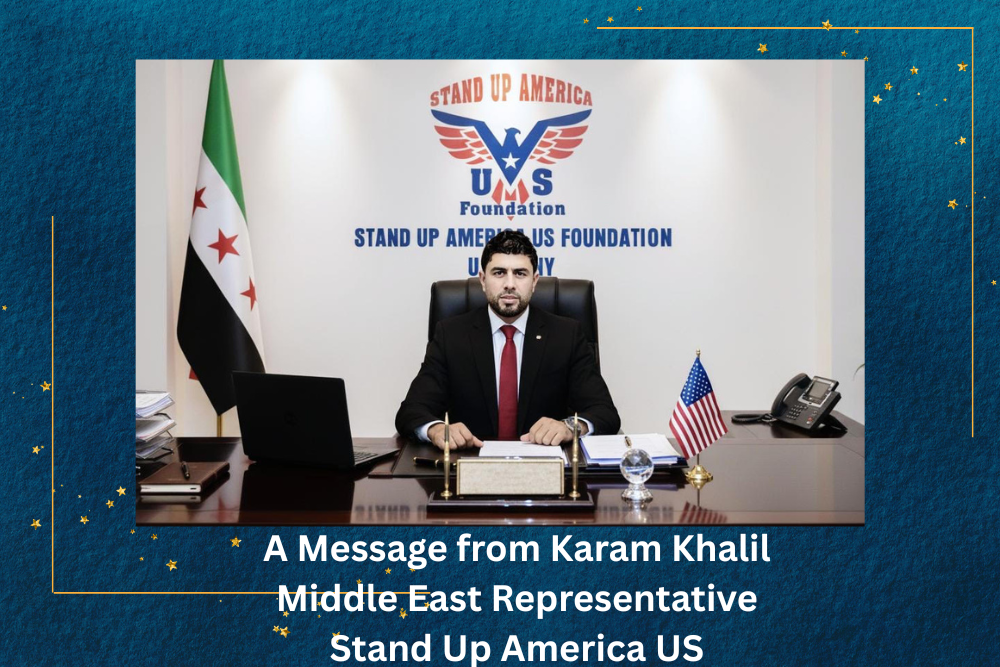By: Senior Advisor Karam Khalil
In the United States, policy is not produced by a single individual; it is produced by the institutional state through checks and balances, cycles of assessment, objection, and consensus. Whoever understands this machinery as it is—not as they wish it to be—can transform their file from a security cost into a partnership asset. The new Syria, with its deep geostrategic geography, can—if it positions itself wisely—draw shared interests with Washington that safeguard its future, modeled on successful arrangements like Japan and Singapore: a functional alliance grounded in interests, not sentiment.
The Governing Rules of U.S. Decision-Making
- Strategy hierarchy: Begins with the National Security Strategy (NSS), cascades into departmental strategies (Defense/State/Treasury…), then into implementation plans, funding programs, and performance indicators.
- Balance of powers: The White House leads on vision, but Congress controls money, sanctions, and oversight; the courts safeguard the Constitution; and the states influence policy through lobbying and economic interests.
- National Security Council (NSC): The coordination hub linking the presidency with departments and agencies through Principals’, Deputies’, and interagency policy committees—where options are shaped and risks logged.
- Risk management, not wishful thinking: U.S. decisions advance incrementally with measurable conditions and a snapback option if commitments are breached.
- The practical-leverage triad: Treasury/OFAC (sanctions & licensing), Defense (hard power & threat management), State/USAID/DFC (diplomacy, development, and development finance).
The Institutional Map as It Is—Not as We Wish It to Be
- White House/NSC: Sets the frame and red lines; balances files where Syria intersects counterterrorism, Israel’s security, competition with Russia/Iran, and regional stability.
- Congress: Factory of sanctions, authorizations, and appropriations; can impose, amend, extend, or suspend sanctions (e.g., Caesar-like frameworks) within clear political bargains.
- Treasury (OFAC) & Commerce (BIS): The operational gatekeepers for any economic opening (general/specific licenses, humanitarian carve-outs, export controls).
- Defense (Pentagon): Prioritizes preventing an ISIS resurgence and constraining IRGC-linked expansion; manages deconfliction arrangements and protects supply lines, airspace, and corridors.
- State/USAID/DFC & Ex-Im: Shape diplomatic realities, legalize exceptions, and finance “low-sensitivity” projects when the legal environment allows.
- The Intelligence Community: Provides real-time and trend assessments that validate or puncture narratives.
- Think tanks, media, and public opinion: Build the “narrative legitimacy” that underwrites—or constrains—policy; those who manage this conversation well earn greater political tolerance for their choices.
What This Means for the Syrian File
Washington seeks a partner who solves problems, not one who creates them. Its agenda in Syria can translate into shared gains if handled through conditional reciprocity:
- Counterterrorism against ISIS and transnational violent networks (including foreign-fighter pipelines).
- Containing unrestrained Iranian influence that fuels border threats and missile/UAV smuggling.
- The Captagon and trafficking supply chains as a U.S.–European internal-security priority.
- Border, neighborhood, and refugee stability to curb migration surges and security gaps.
- Measurable human-rights/ humanitarian guarantees that create political space for sanctions flexibility.
- Regional stability that prevents wider war and reassures allies.
The “Sequenced Reciprocity” Equation: A Workplan for the New Syrian Administration
To shift Washington from skeptical observer to interested partner, adopt a synchronized package—not speeches—across six practical tracks:
- Compliance by design: Stand up a National Compliance Office (legal/sanctions/supply-chain) to engineer OFAC licensing pathways for humanitarian and low-sensitivity public-service projects, with robust beneficiary due diligence.
- Auditable anti-Captagon campaign: Blacklists and network dismantlement, periodic seizure reporting, and information-sharing with international partners—opening the first political window for pressure relief.
- Smart border-security initiative: Jointly monitored points with UN/partners, guaranteed humanitarian corridors, and pre-announced open/close criteria.
- Measurable rights package: Phased releases of defined detainee categories, cessation of specified practices, and programmed humanitarian access—verified by a credible third party.
- Partnered counter-terrorism: A Report–Respond–Assess mechanism with CT partners, and insulation of sensitive areas from escalation.
- Small economic wins, big political impact: Municipally focused service projects (water/waste/feeder electricity) eligible for international licensing and conditional development finance—visible benefits outside prohibited sectors.
In parallel, three enabling tools:
- Track-1.5 official–research channel with leading U.S. institutions to build an institutional—not propagandistic—narrative.
- Bipartisan congressional outreach cell focused on narcotics, refugees, and border security.
- Disciplined strategic communications: One message, monthly performance metrics, and public “scorecards” of delivered commitments and requested reciprocation.
Why the Japanese/Singaporean Model Fits
This is not about “alignment” but about a functional partnership: stable security, clear law, and an open economy—matched by mutual security and political commitments. Such a model does not dilute sovereignty; it protects it—raising the cost of coercion for adversaries and widening the safety net for a recovering economy.
Washington does not change policy with rhetoric but with verifiable, cumulative behavior. When Damascus delivers measurable progress on issues that matter to the United States, sanctions constraints shift from a solid wall to a negotiating mechanism—step by step—within a clear political compact: verified commitments in exchange for programmed flexibility. Only then does Syria move from a “managed file” to a “trusted partner.”
© Karam Khalil — Senior Security/Political Advisor, StandUp America (Middle East).


